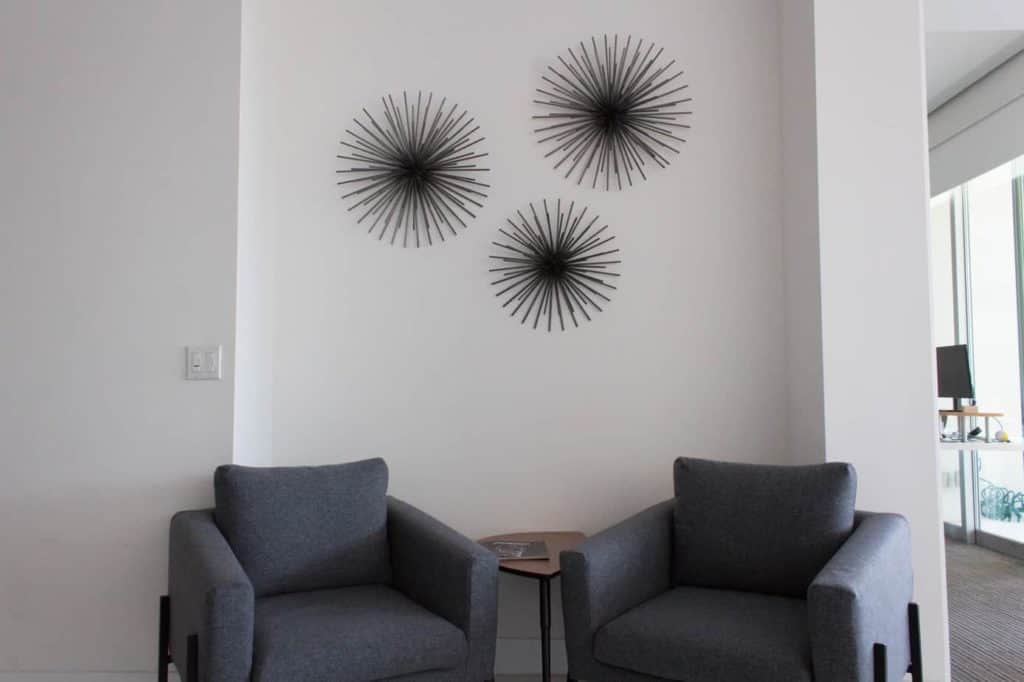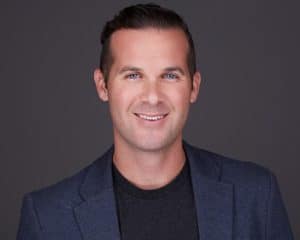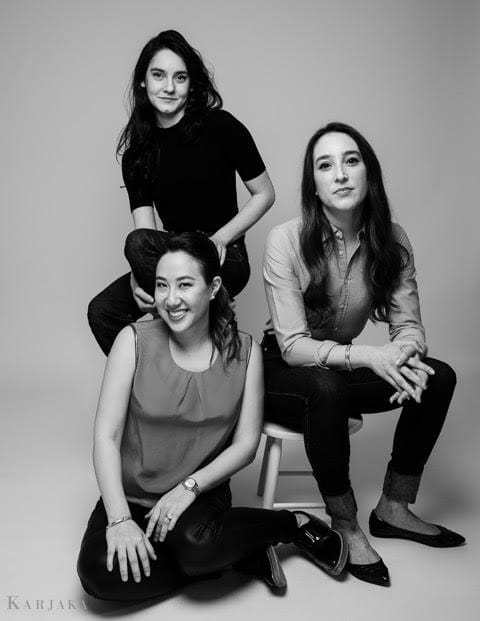 Laura Schubert and Lillian Tung are the co-founders of Fur, a pubic hair care company based out of NYC. Fur is the first line of products that cares for pubic hair and skin. As Laura and Lillian say on the Fur website, “Our products give your pubes a chance.”
Laura Schubert and Lillian Tung are the co-founders of Fur, a pubic hair care company based out of NYC. Fur is the first line of products that cares for pubic hair and skin. As Laura and Lillian say on the Fur website, “Our products give your pubes a chance.”
In this transcribed interview we talk about what led Laura and Lillian to leave corporate jobs and leap into startup life. We also talk about small business marketing tips and mistakes that you can replicate (or avoid) in your first 6 months of being in business.
What’s the journey behind Fur?
Laura: We started working on this a little over 2 years ago. It was really a conversation between my sister and I. My sister is our third business partner. She was thinking about how people groom themselves, specifically about pubic hair and how a lot of people get rid of it.
People only talk about removal. If you type in “pubic hair” into Google, it autofills “removal.” There is never anything about “care.” When you think about the rest of your body – face, hair – it could be about hair removal, but there’s also stuff about making your hair softer. There are ways to care for yourself, and she just didn’t see anything for this part of the body that everyone has. People weren’t talking about it, except as a problem of hair that needed to be removed.
As her sister, she called me and told me that she was Googling for these products and wasn’t finding anything. We started exploring it further, doing research to really make sure there was nothing else out there, and to get to know the market a little bit better.
Then we hired a chemist awhile later. Then Lillian joined after that from L’Oréal in October of 2015. Now we just started hiring a couple more people. So we’re just growing.
Now you have me on Google researching pubic hair to see what comes up.
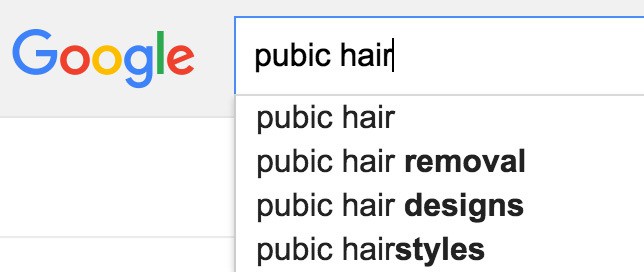
Laura: Yes, we’re the only thing that comes up because there was nothing two years ago.
Lillian: We haven’t invested in SEO because it’s such empty space. You put in “pubic hair care” or “pubic hair oil” or “pubic hair anything” and we do pop up as #1 or #2, which is great. That just goes to show that two years ago when Laura and Emily were talking about it, that’s exactly the problem they were facing.
Lillian, you were at L’Oréal. Laura, you were a management consultant. You two had some good jobs, out in NYC, tell me about the jump you made to pubic hair care. What’s the reactions you received from people?
Lillian: Laura has always had this entrepreneurial streak. She’s always looking for the right idea and has really positioned herself to start a revolutionary company. I’m the complete opposite. I always had a history of large corporate jobs, L’Oréal being the most recent one. But, I thought the idea was completely crazy when I first heard it.
Laura: Lilian and I are best friends since 7th grade. That’s another piece of the backstory.
Lillian: We thought that the topic of pubic hair is really something you share with sisters, whether they are born or found. Laura and I are essentially sisters since the age of 12. She came to me with this idea, and I just thought it was nuts. It took me time to come around, but that’s sort of been the reaction when we tell people that we launched a pubic hair care company. People either think it’s the most amazing thing and can’t believe it’s never existed in their lives. Or, they are very shocked and can’t believe that it’s a real thing.
It’s always a strong reaction in one way or the other. That’s what makes it the most exciting to do when you launch a new company. It’s never a lukewarm reaction. I would much rather have haters and lovers than people who are indifferent.
Do you have any haters? How can you hate on pubic hair?
Laura: It’s interesting. It is polarizing. Some people think it’s awesome and they want the product. But then the people who don’t love it come from a variety of angles. It’s a very personal thing. Especially for women, it can be a real spot of defensiveness for some people. And then for some buyers, we’ve definitely have had some resistance from stores. Again, we have people who get it immediately and they love it. We have stores reach out to us through our email address.
But some stores we reach out to think that pubes are gross. They don’t have anything like this, where would we put it? Some people have this gut reaction to pubic hair. Which is funny, because we all have it.
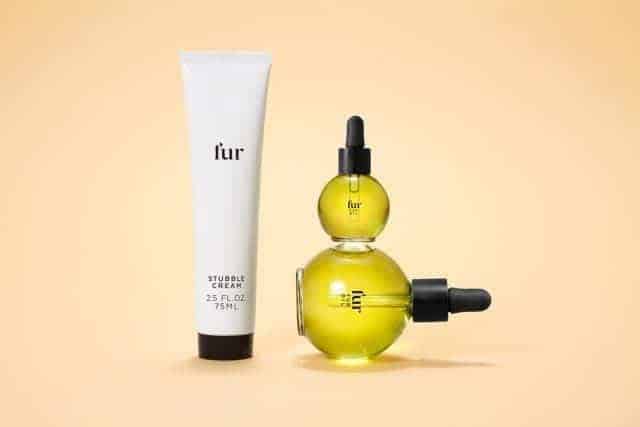 One of things I’ve been impressed with in working with you is how conscious you are of the approach. Everything about the brand from the font to the imagery has to be looking good. That’s what you’re bringing to that gut reaction. Even though some people think it’s gross, you’re bringing an air of sexiness to it. Tell me how you’ve developed a brand, starting with an idea and bringing it to this product that people gravitate to.
One of things I’ve been impressed with in working with you is how conscious you are of the approach. Everything about the brand from the font to the imagery has to be looking good. That’s what you’re bringing to that gut reaction. Even though some people think it’s gross, you’re bringing an air of sexiness to it. Tell me how you’ve developed a brand, starting with an idea and bringing it to this product that people gravitate to.
Lillian: I can’t take credit for the branding. That’s really Emily’s world in her experience at Vogue. But the creation behind the brand is an elegant solution to a modern problem. Nowadays, up until Fur, it was removal or you did nothing. We think it’s a very elegant solution to provide women more options. However, in order for this to not evolve into the cheesy, in your face territory, we are very specific in making sure the brand is tied to classical and elegant elements.
We keep everything very simple. We’re not going to sugarcoat the language we use. A lot of products out there talk about the “area down there” or “the bikini line.” We just call it what it is. Pubic hair. Or, your pubic area. We’re not trying to cause waves by calling it something crazy, like your bush. Nor are we trying to provide all sorts of cute euphemisms either. It’s being open and honest. That’s modern.
The first year of starting a business is a pain in the ass. It’s usually the toughest year. Tell me about some of the hurdles that you’ve had to overcome as a business. And, working together as friends since 7th grade. That is unique. Tell me about what you’ve had to overcome and how you’ve done it.
Laura: Things take a lot of time. With Lillian and I coming from bigger businesses, there are a lot of processes around things. We don’t have anything built in yet. Everything is a painstaking process in creating how Fur does things. I think it’s more exhausting than anything else. But the benefit of our team in working with my sister and my best friend is that we really trust each other. The business is our baby. Even though it takes a lot of steps and thoughts to do something that might seem very simple, that maybe people don’t even notice, to have that support network is what helps us keep going. Because it is just exhausting.
Lillian: It’s just a lack of resources. You have ideas, but there’s a giant black hole. How do you know which people are the right ones who align with your vision who can help execute your ideas?
Looking at your website, you have the craziest press mentions. Tell me how you have managed to get press and how other small businesses can replicate what you’ve done with PR.
Lillian: The thing we did when we were going to launch was identify what’s most necessary. For us, since it’s a new category, we realized validation and education was really high on the list. That’s why we chose to validate and educate through press. We hired a publicist. We knew getting a publicist leads to justifying our business out there. Otherwise, people would think it’s a joke if you didn’t have Vogue and other traditional media outlets writing about us.
We knew we needed connections to these outlets, so we hired a publicist at launch. Now it just trickles in because people have heard about it and it’s been legitimized by the media.
Laura: We probably interviewed 20 or 30 agents.
Wow. Tell me about that process.
Laura: Everything we do has a level of vetting. That process was about building the right list and talking to the right people. There are tons of great partners out there, but who is really going to be the partner that you feel is going to get your business? And really understand your vision and what you’re trying to do. There are a lot of people out there who are really talented. But if they are not quite on your wavelength, we’re too small to educate people and bring people around to how we’re thinking about things. It’s about finding that person who you already feel like is a part of the team when you meet them.
Lillian: I would say the advice to other people who are starting their business, is when you want to invest the time upfront with the right partner because it’s going to save you headaches and money down the line.
In the 7 months since you’ve launched Fur, what hasn’t worked? Where do you wish you could go back and avoided a marketing tactic?
Laura: What we’re really focused on is not investing money on a given tactic until we’re pretty sure it would work if we put more money into it. Staging contracts with any vendors as small pieces of work as a way of establishing tests. It’s different from what a lot of marketing experts will say, but we think that it’s great to live another day.
You just don’t want to make the mistake that kills you. That’s the mistake we’re trying to avoid.
We shampoo and condition our head hair and moisturize every other part of our body, so why don’t we treat our most sensitive area with more respect? Fur’s natural products care for and nourish your pubic hair…and won’t stain your silk. Check them out at www.furyou.com

